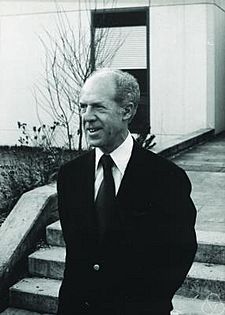Gérard Debreu facts for kids
Quick facts for kids
Gérard Debreu
|
|
|---|---|

Debreu in 1977
|
|
| Born | 4 July 1921 Calais, France
|
| Died | 31 December 2004 (aged 83) Paris, France
|
| Nationality | French |
| Institution | University of California, Berkeley |
| Field | Mathematical economics |
| School or tradition |
Walrasian economics |
| Alma mater | École Normale Supérieure University of Paris |
| Doctoral students |
Graciela Chichilnisky Beth E. Allen Xavier Vives Ishac Diwan |
| Influences | Léon Walras Henri Cartan Maurice Allais Bourbaki |
| Contributions | General equilibrium utility theory topological methods integration of set-valued correspondences |
| Awards | Nobel Memorial Prize in Economics (1983) |
| Information at IDEAS / RePEc | |
Gérard Debreu (pronounced "deh-BROO"; 4 July 1921 – 31 December 2004) was a famous economist and mathematician from France. He is best known for being a professor of economics at the University of California, Berkeley. He started working there in 1962 and later won the 1983 Nobel Memorial Prize in Economic Sciences.
About Gérard Debreu
Gérard Debreu was born in Calais, France. His father worked in the lace manufacturing business, which was a traditional industry in their town.
Before World War II began, he finished high school and started preparing for university entrance exams. He studied in different parts of France during the war. In 1941, he was accepted into a top French university called the École Normale Supérieure in Paris.
In 1944, when he was about to take his final exams, the Normandy landings happened. Instead of finishing his studies, he joined the French army. He served in Algeria and then in Germany until July 1945.
After the war, in 1945 and 1946, Debreu passed important math exams. Around this time, he became very interested in economics, especially in the idea of general equilibrium theory by Léon Walras. This theory tries to explain how supply and demand balance out across an entire economy.
From 1946 to 1948, he worked as a research assistant, slowly moving from focusing only on math to also studying economics. In 1948, he traveled to the United States on a special scholarship. This allowed him to visit many American universities, as well as universities in Sweden and Norway. He earned his Ph.D. from the University of Paris in 1956.
In 1946, Debreu married Françoise Bled. They had two daughters, Chantal and Florence. Gérard Debreu passed away in Paris on New Year's Eve in 2004, at the age of 83.
His Work in Economics
In 1950, Gérard Debreu started working at the Cowles Commission at the University of Chicago. He stayed there for five years, often traveling back to Paris.
A very important moment in his career was in 1954. He published a groundbreaking paper with Kenneth Arrow called Existence of an Equilibrium for a Competitive Economy. In this paper, they used advanced math, specifically a field called topology, to prove that a general equilibrium can exist in an economy. This was a big step forward in understanding how markets work.
In 1955, he moved to Yale University. Then, in 1959, he published his famous book, Theory of Value: An Axiomatic Analysis of Economic Equilibrium. This book is considered one of the most important works in mathematical economics. In it, Debreu created a clear, step-by-step mathematical foundation for how competitive markets operate. He also showed how an economy can reach a balance, or equilibrium. He even explored how to include uncertainty in economic models, introducing the idea of a "contingent commodity." This is like a promise to deliver a good only if a certain event happens, and it's now a key idea in financial economics.
In January 1962, Debreu began teaching at the University of California, Berkeley. He held important titles there, including University Professor. He continued to teach until 1991.
Later in his career, he studied "differentiable economies." This work showed that, usually, an economy has a limited number of price points where supply and demand perfectly balance.
Gérard Debreu received many honors for his work. In 1976, he was given the French Legion of Honour. In 1983, he won the Nobel Memorial Prize in Economic Sciences. He received this award for bringing new mathematical methods into economic theory and for making the general equilibrium theory much clearer and more precise. He was also a member of several important academic groups, including the United States National Academy of Sciences. In 1990, he served as the president of the American Economic Association.
See also
 In Spanish: Gérard Debreu para niños
In Spanish: Gérard Debreu para niños
 | Mary Eliza Mahoney |
 | Susie King Taylor |
 | Ida Gray |
 | Eliza Ann Grier |

